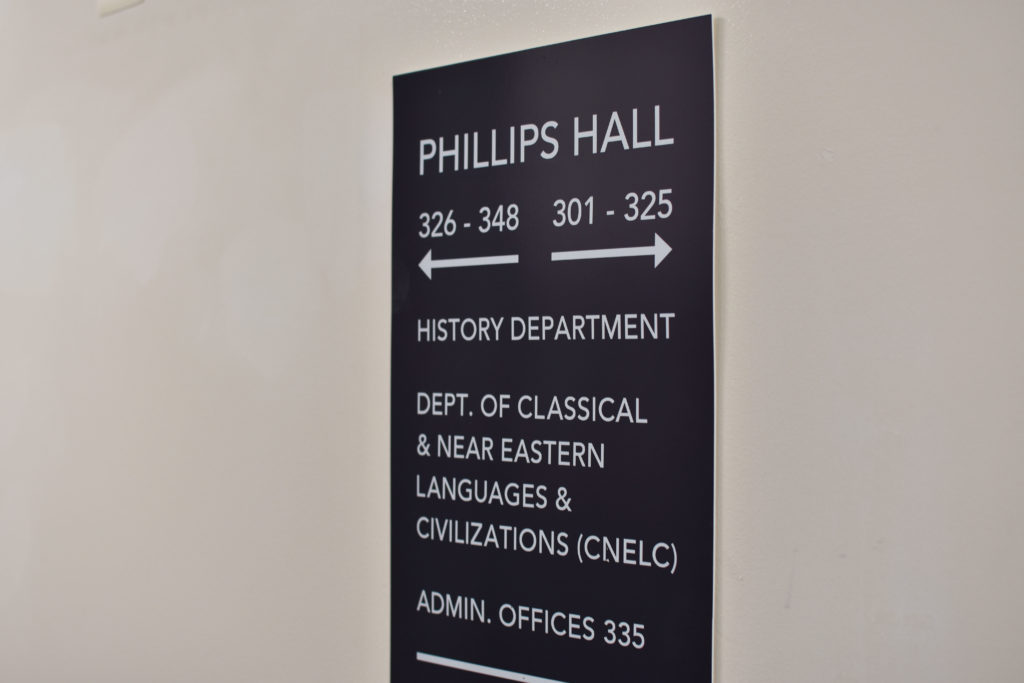A history professor has spent the last three years working on a book published earlier this month that he said more accurately frames the history of the first Thanksgiving.
History professor David Silverman published a book Nov. 5 titled “This Land is Their Land: The Wampanoag Indians, Plymouth Colony and the Troubled History of Thanksgiving,” which debunks the Thanksgiving story typically described as a peaceful feast between English pilgrims and members of the Wampanoag tribe. Silverman said he hopes the book will prompt a conversation about how “sanitized myth-making” surrounding Thanksgiving misrepresents native people and ignores the “trauma” pilgrims inflicted on Native American populations.
Silverman said the traditional Thanksgiving story describes Plymouth colonists and the Wampanoag tribe sharing an autumn harvest feast as a declaration of friendship in 1621. He said the story of Thanksgiving has become a “sanitized bedtime story” that allows white Americans to have a clear conscience about the harmful consequences of colonialism, which disrespects Native Americans.
“One of the damaging aspects of this myth is that it makes our native countrymen and women feel discarded, disrespected, it makes them feel like the country makes light and even celebrates their trauma,” Silverman said.
He said he was first introduced to the Wampanoag community 20 years ago when writing his dissertation on the tribe and its ancestral roots in Martha’s Vineyard. Silverman said the subject of Thanksgiving was repeatedly mentioned when he interviewed Wampanoag members for his dissertation research.
He said the Wampanoag consider the holiday a “miserable” experience for the tribe members in school who saw their culture reduced to drums and decorations.
“They would tell me stories about how their teachers would attach to the celebrations of the mythical Thanksgiving history lessons in which they taught that the New England Indians were all gone, even as New England Indians were sitting here, right in front of them,” Silverman said.
He said Anglo-American Protestants designed the “fairy tale” of Thanksgiving in the 1800s to foster a sense of shared “white identity” as a reaction to the influx of Catholics, Irish, Italians, Jewish and Eastern Europeans immigrating to the United States.
Silverman said the Thanksgiving story designates Anglo-Americans as the founding fathers of the country and erases thousands of years of Native history, which encourages white nationalism. He added that his book does not argue against the celebration of Thanksgiving but rather urges the reader to understand its true origin and reflect upon it.
“I like Thanksgiving as much as the next guy,” Silverman said. “But we don’t need to attach getting together with family and friends and reflecting on the goodness of our lives to a false, damaging history. The two don’t have to go hand in hand. And so I say, either dispense with the myth, or get the history right.”
History experts who study Native American relations said few books accurately depict the historical origins of Thanksgiving, but publishing accurate accounts of the holiday can dispel ignorance about social issues that affect Native American communities.
George Price, a lecturer at the University of Montana and a descendant of the Assonet band of the Wampanoag tribal nation, said painting settlers’ actions as “benevolent” justifies the harm colonialism posed on indigenous populations. Price said the accurate history of the holiday is not usually included in history curricula, which contributes to a lack of awareness of the issues Native American people have faced in the past and present.
He said publishing books that accurately chronicle the history of Native American people can correct the misinformation that surrounds the holiday and deconstruct power structures that perpetuate the subjugation of indigenous people.
“The publishing and teaching of truth is one time-tested remedy for the proliferation of falsehoods,” Price said in an email. “When the particular falsehoods uphold unjust social power structures, as they so often do, the task is not easy, but it is even more necessary.”
Toni Tsatoke-Mule, a lecturer in Native American Studies at the University of Oklahoma and a member of the Kiowa tribe, said inaccurate accounts of Thanksgiving foster “indifference, denial and resentment” among an uneducated public.
She said accurate accounts of the holiday are “welcomed and needed” to describe the complex interactions between the pilgrims and Wampanoag and help readers comprehend the issues presently affecting Native American populations.
“This lack of education leads to confusion among the public as to why these topics are issues for anyone,” Tsatoke-Mule said in an email. “More accurate accounts are welcomed and needed for all age groups to provide a more comprehensive view of the complex and conflicting interests of the people involved.”





